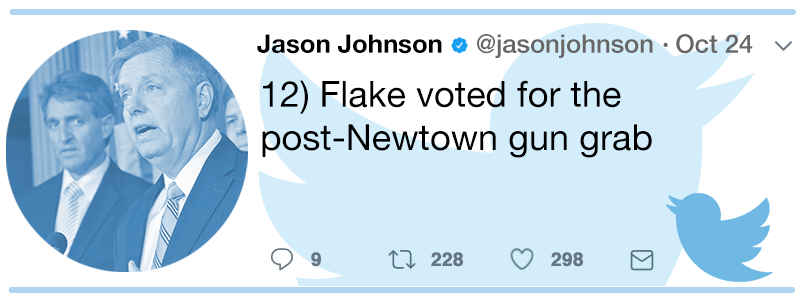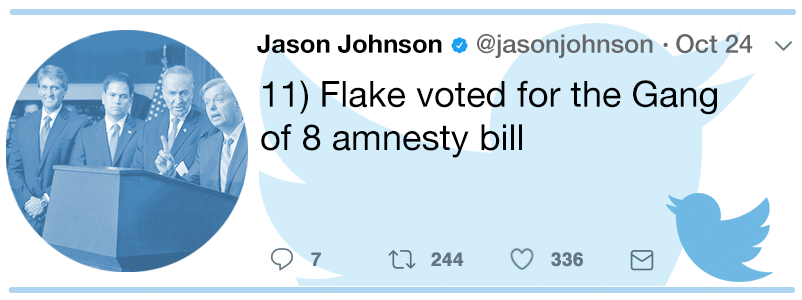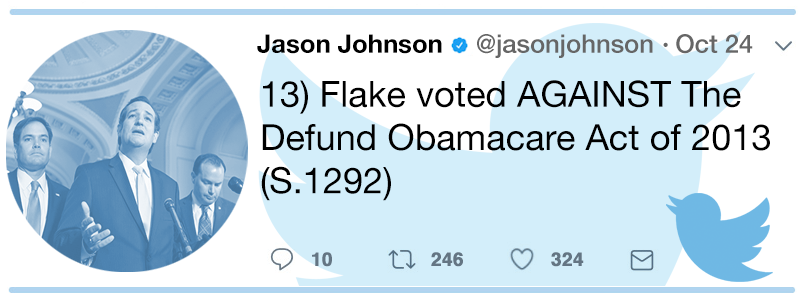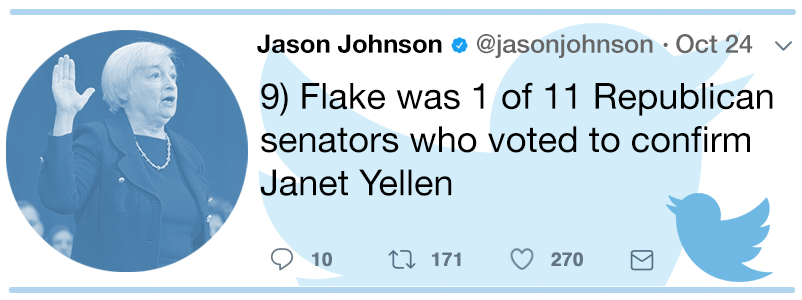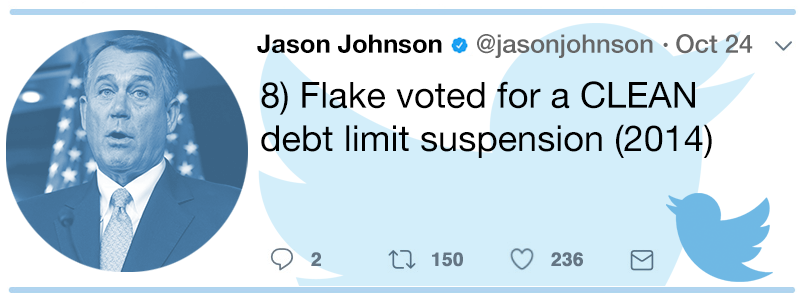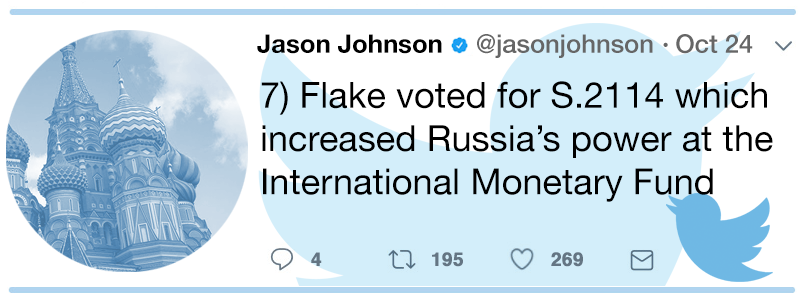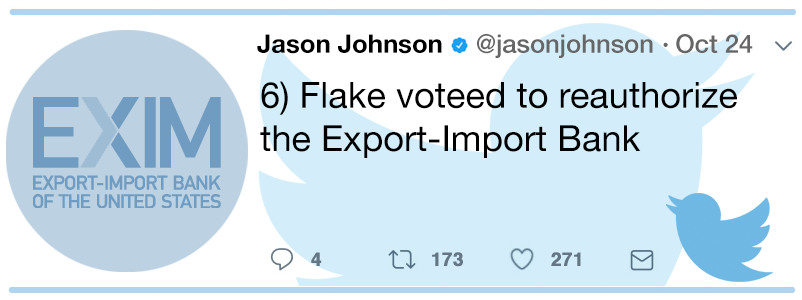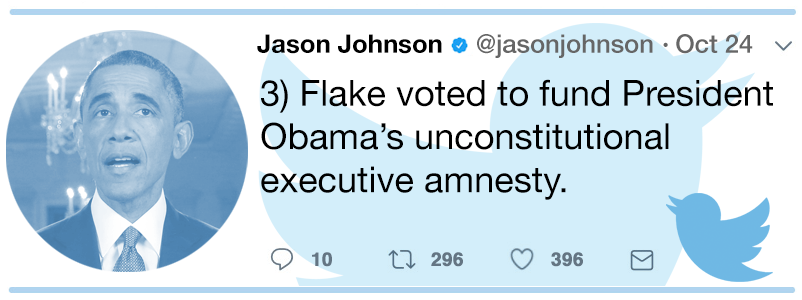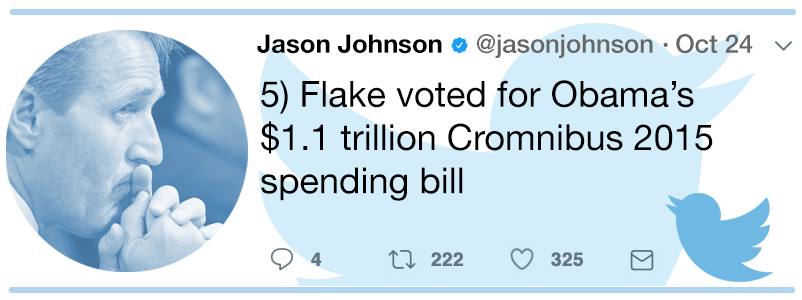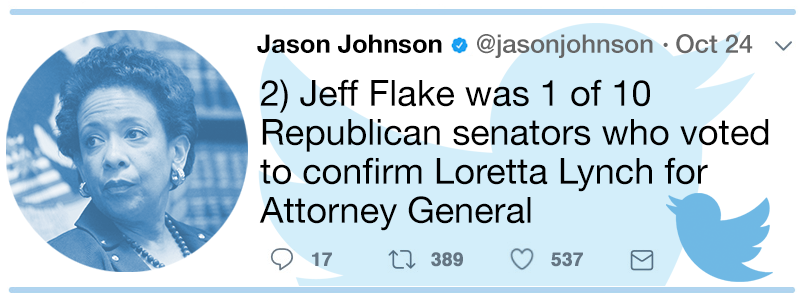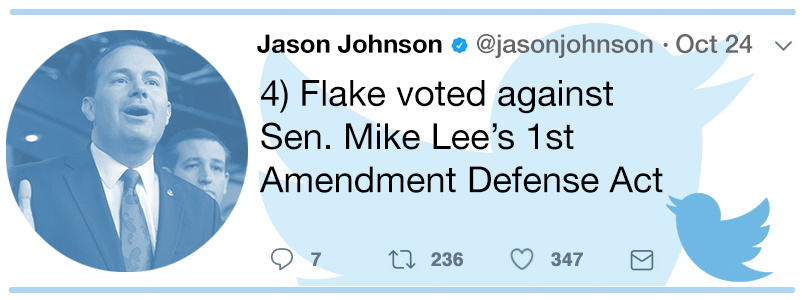13 tweets: As Flake retires, a Cruz ally blames him for Senate 'discord and dysfunction.' Let's look at the record.

After Jeff Flake announced Tuesday he was retiring from the Senate, he was lauded by many for his floor speech in which he lamented that American “democracy is more defined by our discord and our dysfunction than by our own values and principles.”
Flake laid much of the blame at the feet of President Trump.
In the analysis that followed, a frequent theme was that Flake was voicing the secret views of many Republican colleagues who were too cowed by Trump’s popularity among the GOP base to speak out. But others took a different view, that Flake himself was the problem. Speaking for that faction was a former top aide to Sen. Ted Cruz, R-Texas, who tweeted a list of reasons why Flake, rather than Trump, had “helped create this environment.”
Jason Johnson, an Austin-based consultant, has worked for Cruz since 2011, and was the chief strategist on his presidential campaign. Johnson’s list is a good way to examine the way that Cruz views the world. It’s a guide to most of the major strategic moves that the Texan has made in his first term.
Most of the things Johnson listed were issues where Cruz chose to draw a line or provoke a fight, and where Flake either outright opposed Cruz’s objective or believed that simply blocking momentum toward some kind of resolution in Congress was not the best course of action.

And it’s this basic difference that illuminates the difference between a Cruz and a Flake — a difference that is at the heart of the division rending the Republican Party. Cruz has made being a “fighter” the signature of his career in national politics so far, no matter how seemingly hopeless or quixotic the stated goal. And for Cruz, fighting means refusing to accept anything other than total victory. So far, that approach has garnered him plenty of national attention and made him the runner-up to Trump for the Republican presidential nomination last year. But he has done little to work with Democrats to find solutions to problems facing all Americans, which is the function of the Senate.
Flake, meanwhile, has fit the more traditional mode of what a senator seeks to be, more willing to try to find a way forward and to accept compromise rather than insisting on his version of purity. And that’s despite the fact that he came up through the House as a largely uncompromising conservative, and has a 93 lifetime rating from the American Conservative Union, basically tied with former senator and current U.S. Attorney General Jeff Sessions, no one’s idea of a Republican in name only.
“The list of fights he joined in the House was long,” wrote Ben Domenech on Wednesday. “It’s hard to remember what major fight he chose to advance in the Senate. … Flake left his populism behind.”
But, to state the obvious, the Senate is different from the House. The Senate exists to produce enduring compromise between the two parties. It is set up to make it difficult if not impossible for either side to impose its will on the other. It forces the two sides to come together. It is possible to be a conservative and a populist in the Senate, but to get anything done, a senator has to work well with others.
And ultimately, the forces on the right and left who demand purity and absolutism from their senators are all but guaranteeing that the Senate cannot function as the Founding Fathers intended, which only strengthens the hand of those who argue for centralizing power in the presidency. That’s the unintended irony for conservatives.
The Cruz view, and Johnson’s list, are the product of political trends decades in the making.
Partly it represents a strain of conservatism that is driven by frustration — going back at least to the 1980s and in some ways to the Goldwater movement in the 1960s — that the size of the federal government hasn’t shrunk, defying promises by every Republican administration at least since Reagan. The motivations for trying to reduce government are both fiscal and cultural. Free market conservatives believe in an unfettered capitalist economy as a preeminent good that benefits all. But the religious right’s cultural grievances also factor into their desire to limit the size and reach of the federal government, which they view as enforcing a liberal social agenda on issues such as education, church-state separation and civil rights.
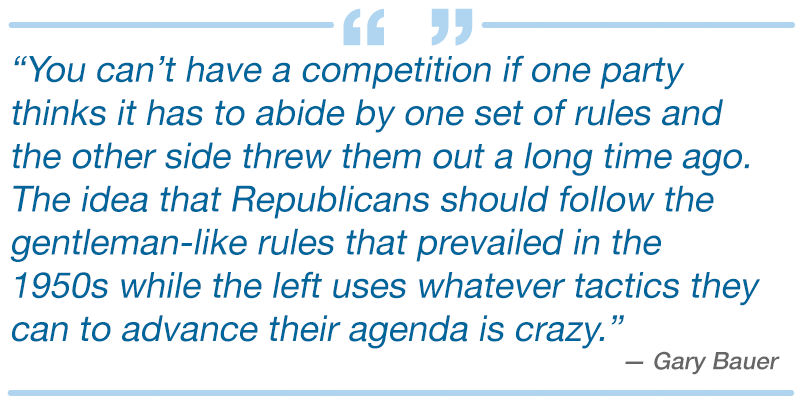
There are serious questions about whether the right’s vision of smaller government will work for a highly urbanized society and a globalized, 21st-century economy. Do Americans, even those who belong to Posse Comitatus, really want to rely on their county sheriff to protect them from predatory credit card companies or salmonella in their hamburgers? But against that is the pull of localism, the rebellion of Americans who feel alienated from a government in faraway Washington and who want to buy goods from local merchants rather than from giant corporate monopolies.
But the right’s frustration over their inability to dramatically reduce government is a big reason why many view any compromise with Democrats as selling out. Their paradigm is that playing by the rules — being a good senator who works across the aisle, working toward solutions in a bipartisan manner — has resulted only in a slow but steady erosion of their vision for the country. Democrats always want more spending, they have politicized the judiciary since Robert Bork’s Supreme Court nomination was scuttled in 1987, and the left is always getting more liberal on social issues. The right has seen the country for some time as standing on the edge of a cliff, in danger of falling into an abyss. And so in that paradigm only dramatic and revolutionary action can stem the tide. Anything less than that is cowardice.
Gary Bauer, a grizzled veteran of the culture wars, articulated this view well in an interview with me recently: “You can’t have a competition if one party thinks it has to abide by one set of rules and the other side threw them out a long time ago. The idea that Republicans should follow the gentleman-like rules that prevailed in the 1950s while the left uses whatever tactics they can to advance their agenda is crazy.”
(Many Democrats, of course, would offer the identical analysis, with the labels switched.)
So in recent years, the right has come to view opposition as its only option. In addition, decades of demonizing government in all forms (“Government is the problem,” Reagan declared) have bred scorn for the idea that government can or should do anything other than stand up an army and a police force. President Obama was considered so liberal (and by many whites as so foreign) that everything he did was viewed with suspicion.
And tribal voter attitudes toward those with whom they disagree is making things worse. “Hyperpolarization is a powerful disincentive to compromise. How can you make concessions to your mortal enemies? To even start negotiations can be viewed, in this context, as surrender,” Tom Edsall wrote in the New York Times Thursday.
All of this created what we have now. A frustration decades in the making reached a boiling point with the 2009 stimulus bill and then the 2010 health care bill, which was passed on a party-line vote by Democrats using the controversial mechanism of reconciliation to get around a filibuster, a legislative device that Republicans are now making the de facto norm for anything they want.
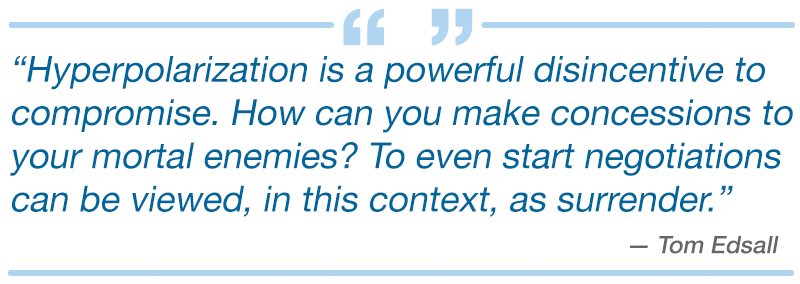
The boiling over of that frustration led conservatives like Cruz to make a promise that was completely untethered to reality: that they could repeal Obamacare while Obama was president. That led to the 2013 government shutdown. And while Cruz and the Heritage Foundation are most to blame for that overpromising, most Republicans followed their lead and ran campaigns in 2014 that promised to repeal Obamacare if they won. They would parse and say they were articulating an aspirational goal, but voters don’t parse. They hear promises and expect them to be kept.
Unkept promises are one big reason why voters are angry. But politicians have made promises they can’t keep. Cruz has been the most prominent practitioner of this type of politics. A detailed look at the facts behind each of the issues mentioned in Johnson’s list is a good way to see this.
Let’s take them one by one. I have rearranged them in chronological order.
_____
Flake voted to increase debt by $900 billion in exchange for the promise of discretionary cuts in the future (2011).”
This is a reference to the debt ceiling showdown of 2011, which resulted in the passage of the Budget Control Act that August. Republicans had just retaken control of the House in the 2010 elections, and they refused to raise the debt ceiling unless Democrats agreed to spending cuts. But the brinksmanship in the summer of 2011 over the debt ceiling sparked the worst stock collapse on Wall Street since the 2008 banking crisis, and it led one of three major credit-rating agencies to downgrade the U.S. government’s rating.
Despite all that, Johnson is wrong to say that Flake voted for it. Flake, who was then a member of the House and would run for the Senate the following year, voted against the BCA. But Johnson counts Flake’s vote in favor of a preliminary version of the BCA — a version which failed in the Senate — as a vote for the BCA. It’s convoluted logic, but Johnson based his assertion on an analysis by the Heritage Foundation’s political arm — Heritage Action — that said the July 29 House vote “paved the road for complete capitulation” on the issue of demanding a balanced budget amendment to the Constitution. But the July 29 version included a balanced budget requirement (which, incidentally, Democrats in the Senate were never going to agree to). The July 29 House bill also required $1 trillion in spending cuts. Yet Heritage was dissatisfied that the balanced budget requirement only kicked in on the second increase in the debt limit.
In addition, Flake has shown a long-standing interest in reducing the national debt. Flake has been proposing every year since 2010 a bill to allow individual citizens to designate up to 10 percent of their federal income taxes to pay down the nation’s nearly $20 trillion dollar national debt.” It may have been more of a messaging gimmick than a serious legislative proposal, but it demonstrated an interest in raising awareness on the issue.
“Unless Congress can get this fundamental issue under control, nothing else we do here will matter very much,” Flake said of the debt this past July when he reintroduced the bill. “That is why there ought to be an option that allows taxpayers to take matters into their own hands.”
Regardless, Johnson’s description of the BCA is telling. He makes it sound like the spending cuts were tentative, when in fact the law put in place caps on spending that have taken effect and had an impact. “The 2011 Budget Control Act (BCA), though imperfect, was effective in cutting discretionary spending,” wrote Heritage Action in 2013, overlooking their own opposition to the BCA at the time it passed. And most economists regard the brinksmanship over the debt limit that led to its passage as dangerous and irresponsible.
_____
Flake voted for the post-Newtown gun grab
In April of 2013, Flake voted against expanded background checks, which was the key gun control vote in the Senate after the murder of 20 children and 6 adults at Sandy Hook Elementary School in Newtown, Conn., on Dec. 14, 2012.
But Cruz, who had just entered the Senate after winning his seat in the 2012 election, mounted a filibuster to try to stop the Senate from even voting on any gun control measures. Flake voted with 15 other Republicans to end Cruz’s filibuster and move to a debate and vote.
That is what Johnson is referring to when he says Flake “voted for the post-Newtown gun grab,” even though Flake ultimately voted against any form of gun control.
_____
Flake voted for the “Gang of Eight” amnesty bill
On June 27, 2013, the Senate passed an immigration reform bill by a large margin, 68 votes in favor to 32 opposed. Flake voted for the measure. Ultimately, the bill’s path to final approval fell apart in the House, with Cruz encouraging opposition among members of the lower chamber.
Immigration has been a hot-button issue for many Americans for longer than a decade. George W. Bush tried and failed to pass a reform bill. The 2013 effort failed. And Donald Trump’s rise to the presidency was fueled in part by his vow to build a wall on the U.S.-Mexico border.
Conservatives weren’t satisfied with the border-security provisions in the 2013 bill, and felt it gave undocumented immigrants too easy a path to citizenship. But for their part, the right has shown little appetite to constructively work with Democrats to find a solution to the problem of millions of people in the country whose unresolved status creates a multitude of problems for tax collection, health care costs and law enforcement.
_____
Flake voted against the Defund Obamacare Act of 2013 (S.1292)
In late July of 2013, Cruz introduced a bill that would withhold funding from the implementation of President Obama’s signature health care law. But the issue didn’t draw much attention until the fall, when it dawned on Washington that Cruz might be willing to shut down the government simply to prove a point. Cruz and his allies argued that a shutdown might force Democrats to come to the negotiating table, but that didn’t persuade many people.
“Those who are pushing this proposal are telling people that it’s going to defund Obamacare, and it just won’t,” Flake said at the time. “If you want to know why we’re in such low regard with the country, it’s that they don’t believe us when we tell them something.”
Flake pointed out that a shutdown “would distract attention from Obamacare and be more focused on funding government.”
S.1292 never came to a vote in the Senate. It had 32 co-sponsors, all Republicans, but Flake was not among them, which might be the source of Johnson’s rancor. The House in fact voted several times at the end of September 2013 to pass a government funding bill that withheld money for Obamacare, and each time, the Senate stripped out the provisions that were aimed at Obama’s health care law. But Flake did not vote with Democrats any of those times (votes 205 through 212 in the first session of the 113th Congress).
The Wall Street Journal editorial page lambasted Cruz’s antics as a “circus” and “Beltway kabuki” that was distracting conservatives from better opportunities to bring down spending. The Journal said that Flake and Sen. Tom Coburn, R-Okla., were “genuine fiscal conservatives” who were “shrewder Republicans” than Cruz and the others heading toward a shutdown, because Flake and Coburn were focused on a different tactic: easing temporary sequester cuts on a small percentage of the federal budget in exchange for reductions to a bigger portion of the budget that would be permanent.
“An offer to ease the sequester has a far better chance to win entitlement reforms worth the name, perhaps including a delay in some or all of Obamacare, than does a government shutdown that Mr. Obama would welcome so he can blame Republicans one more time,” the Journal wrote.
Cruz’s crusade ultimately led to a shutdown of the government for two weeks. The ploy excited the conservative base, raised a lot of money and drew a lot of attention. But it didn’t do anything to remove Obamacare.
The Journal dismissed groups like Heritage, and by extension Cruz, for “accusing Republicans for being spineless for not joining the defund chorus that has little or no chance of succeeding while President Obama occupies the White House.”
_____
Flake voted for the Ryan-Murray budget, which lifted spending caps and raised fees in exchange for promises of future spending cuts
Flake voted against the Ryan-Murray budget on Jan. 16, 2014, but because he voted in December 2013 to allow the Senate to proceed to debate and a final vote on the issue, Johnson counts him as having voted for the Ryan-Murray budget.
Flake said after his vote in December that he would be voting against the budget deal, but argued that the issue deserved a vote. “While I admire the effort to craft a compromise and believe the Senate needed an opportunity to debate this bill, I simply couldn’t support a budget agreement that trades spending increases today for potential spending cuts years down the road. We’ve seen that movie before, and we know how it ends,” Flake said.
The budget deal was reached at the end of that year after extensive negotiations between the House Budget Committee chairman at the time, Rep. Paul Ryan, R-Wis., and the Senate Budget Committee chairman, Sen. Patty Murray, D-Wash. It was a significant development given that a leading Democrat and a leading Republican were able to work together, overcoming, even briefly, the partisan gridlock that had characterized Congress over the previous few years.
As for the deal itself, it’s noteworthy that Johnson refers to the lifting of spending caps here, because in his tweet about the 2011 Budget Control Act, he characterized the spending caps as a mere “promise of … cuts.” Here, he’s treating the same BCA legislation he ridiculed before as something worth keeping in place.
Regardless, the Ryan-Murray deal avoided another government shutdown and did raise spending caps. But the caps were still below what Obama’s 2011 budget had proposed. In January of 2014, the Senate and House both approved the deal. The Senate did so overwhelmingly, by a vote of 72 to 26.
Cruz opposed the measure, again on the grounds that it “allows continued funding for Obamacare.” It was a good sound bite for the conservative grassroots, but his talk of defunding the health care law was a fantasy unless Republicans won the White House (and, it turns out, even when they did win the White House).
_____
Flake was one of 11 Republican senators who voted to confirm Janet Yellen
On Jan. 6, 2014, the Senate voted to confirm Yellen as chair of the Federal Reserve. Again, Cruz was leading the charge against her confirmation, trying to use her nomination as an opportunity to require an audit of the Fed. That was a cause du jour among supporters of Rep. Ron Paul’s 2012 presidential campaign, and it was fueled by concerns over the national debt after the 2008 fiscal crisis. Many debt hawks were alarmed by the Fed’s policy of quantitative easing (QE), warning that it could spark a debt crisis. But Yellen was a supporter of the policy and continued it, and so far the warnings about the consequences of QE have not come to pass.
Flake voted for Yellen, who was confirmed, 56-26.
_____
Flake voted for a clean debt limit suspension
In February 2014, the debt ceiling again came up for a vote. It had been temporarily raised after the government shutdown the previous October, and Republicans had passed only a short-term extension so they could try to extract spending cuts and other concessions from the Obama administration. But the public backlash to the shutdown had severely chastened many Republicans in the House, and with the midterm elections approaching in the fall, most members wanted no part of another shutdown. Yet most House Republicans refused to vote for raising the debt ceiling, preferring to rely on Democrats to pass it with a handful of Republican votes. “They remain unwilling to vote for some compromises, preferring the ideological purity of opposing something they know will pass with Democratic support,” the Washington Post wrote.
House Speaker John Boehner tried to get the Republican majority in the House to agree on a proposal to take to the White House. But the episode illustrated the diminishing influence of party leaders over their members. Boehner had to rely on 193 Democrats to vote for the ceiling increase on Feb. 11, receiving support from only 28 Republicans. As the matter moved to the Senate, Sen. Bob Corker, R-Tenn., pointed out the obvious: “The House could only pass a clean debt ceiling.” That meant Senate Republicans, who were still in the minority, had little leverage in attempting to extract spending cuts from the Obama White House. Many Republicans facing reelection in the fall didn’t want to vote for the debt ceiling increase under any circumstances, even though a failure to do so would risk sending the country into another economic crisis.
Despite this, Cruz filibustered the debt ceiling vote, again showing a willingness to shut down the government to make a point and to try to force Democrats to make a deal. On Feb. 12, a total of 31 Republicans voted to sustain the filibuster; all but four — Cruz, Sen. Deb Fischer of Nebraska, Sen. Dean Heller of Nevada and Sen. Roger Wicker of Mississippi — were up for reelection either in 2014 or 2016. Cruz’s filibuster was overridden by a vote of 67 to 31, with Flake being one of 12 Republicans to vote to proceed to a vote. When the Senate voted to increase the debt limit itself, Flake voted against that. “An increase in the debt limit should be accompanied by structural reforms that deal with excess spending. This measure did not,” Flake said.
The increase passed anyway by a vote of 55 to 43. It was the first “clean” increase since 2009.
Cruz said that because of the vote, the “fiscal and economic condition of this nation [is] even worse because of a lack of leadership.” He held himself up as an example of purity and righteousness. Others, like Rep. Tom Cole, R-Okla., said that true leadership in this situation was shown by people like Boehner and McConnell, who made unpopular decisions — at a cost to themselves — to shield members of their own party who didn’t want to take the risk of voting for something that was inevitable and necessary, but which would cost them politically.
_____
Flake voted for S.2114, which increased Russia’s power at the International Monetary Fund
It took some digging to find this one, in part because Johnson got the number of the bill wrong. It was Senate Bill 2124, which the Senate voted on in March 2014. It was a bill mostly intended to help stabilize Ukraine during its military conflict with Russia, but Cruz objected to a provision in the bill that would have made changes at the IMF. Cruz, as well as other Republicans like Sen. Marco Rubio, R-Fla., said that the IMF reforms were a boon for Russia. It’s worth noting that at the time Rubio was in the midst of an all-out attempt to win back favor from the Republican base after his attempt to lead passage of immigration reform the previous summer had crashed and burned.
On March 24, the Senate invoked cloture on the bill by an overwhelming vote of 78 to 17, with Flake voting in favor. But Senate Majority Leader Harry Reid, D-Nev., ended up taking out the IMF reforms to pass the Ukraine aid package, which was approved by the Senate on March 27.
The IMF reforms eventually did pass into law at the end of 2015, in a budget bill that Flake voted against.
_____
Flake voted to reauthorize the Export-Import Bank
This claim by Johnson stumped even one of the most outspoken opponents of the ExIm Bank, Tim Carney. Carney called Johnson out on Twitter, saying, “Misleading your followers and attacking allies is bad practice. Flake consistently opposed Ex-Im. Beef with him on other issues.” In response, Johnson pointed to Flake’s vote for a continuing resolution that funded the government on Sept. 18, 2014, and which included a nine-month extension of Ex-Im. Carney dismissed Johnson’s claim as specious.
Conservatives believe Ex-Im to be a source of corporate welfare for big companies, propping up a pay-to-play economy rather than a business environment that allows small businesses to compete and flourish. The government’s export credit agency was de-authorized in June 2015, but then re-authorized later that year.
_____
Flake voted to fund President Obama’s unconstitutional executive amnesty
This is a reference to a vote that was essentially a show vote engineered by Cruz on Dec. 13, 2014, as part of a crusade he was waging against then President Obama’s executive orders on immigration. The first order, known as DACA, was issued in 2012. The second, known as DAPA, came out in November of 2014. Cruz said he believed the orders were outside the realm of presidential power and therefore unconstitutional. He was also preparing to announce his own run for president in just a few months.
Flake and many other Republicans agreed with Cruz. On Nov. 22, Flake and the other Arizona member of the U.S. Senate, John McCain, wrote an op-ed in which they criticized Obama for taking unilateral action to resolve the status of some percentage of undocumented immigrants, rather than working with Congress. “Immigration is an issue that must be debated and decided by the representatives of the people, not by executive fiat,” Flake and McCain wrote. “We had hoped that President Obama would, at the very least, give the new Congress a chance to engage on this issue next year before contemplating any action.”
“But it is now clear that he is more interested in using the issue to the Democrats’ political advantage in 2016 than he is in reaching across the aisle to address this pressing national challenge once and for all,” the two Republicans wrote. Flake also said the Senate should come together to address the issue and show that Obama’s unilateral action was unnecessary.
Cruz staffers, however, said that no one but Cruz was offering solutions. And as the Senate was readying passage of a $1 trillion spending bill that funded most of the government (and reduced budgets for agencies like the EPA and the IRS), Cruz blocked the bill long enough to force a vote on whether the president’s immigration actions were constitutional. His motion, which, if successful, would have derailed the painstakingly negotiated spending agreement, was a PR stunt. Only 21 of 45 Republicans voted with him, and of those, all but five were up for reelection in the next cycle or planning a run for another office and had reason to fear a primary challenge from the right.
Incidentally, while Flake did vote against Cruz’s point of order, he did not vote for the funding bill that former Cruz adviser Johnson says he did. He voted against it. Another Cruz aide, Brian Phillips, said on Twitter that because Flake voted to cut off debate on the bill and proceed to a final vote (known as invoking cloture), that is as good as voting for the bill itself, because cloture requires a higher threshold of 60 votes, and passing legislation requires only a simple majority of 50 votes.
_____
Flake voted for Obama’s $1.1 trillion Cromnibus 2015 spending bill
Flake voted against the so-called Cromnibus, but Johnson said he counted his vote for cloture as the real vote. But regardless, since the Cromnibus represents a big conservative complaint from the past few years, it’s worth briefly revisiting the arguments for and against.
The Cromnibus was a bill — at the end of 2014 — to fund most of the government for 2015. Congress was trying to avoid a second government shutdown.
The odd name for the bill combines the terms “continuing resolution” and “omnibus.” The continuing resolution referred to the Republican insistence on funding the Department of Homeland Security for only a few months, so that they could come back to the issue when DHS needed to be funded again, and try to take out funding to enforce Obama’s immigration executive orders. The omnibus referred to the year-long funding provisions for most of the other portions of the federal government. In the past, before Congress became as dysfunctional as it is now, the government was funded through an appropriations process that wound its way through committees in both the House and the Senate (here is a primer on how it’s supposed to work).
Like the government shutdown of 2013, in which health care was at issue, outside groups like the Heritage Foundation pressured Republicans to use the vote to defund Obama’s executive initiative on immigration, even if it meant shutting down the government again.
The Cruz/Heritage gambit failed to achieve its policy goal, as it had failed in 2013. But Cruz and Heritage used the issue to grow their email-lists and raise money. Democrats also benefited, because a procedural side effect of Cruz’s maneuver enabled them to get several controversial nominees confirmed.
_____
Jeff Flake was one of 10 Republican senators who voted to confirm Loretta Lynch for attorney general
The other Republicans who voted for Lynch were Kelly Ayotte (N.H.), Orrin Hatch (Utah), Lindsey Graham (S.C.), Susan Collins (Maine), Mark Kirk (Ill.), Rob Portman (Ohio), Thad Cochran (Miss.), Ron Johnson (Wis.) and Mitch McConnell (Ky.).
Notably, Cruz “who said he would oppose Lynch, missed the vote” on April 23, 2015. He was the only senator to miss the vote. And he did so because he had launched his campaign for president one month earlier, and chose to attend a fundraiser for that effort instead of voting on the Lynch nomination.
But he did find time to rail against the very act of taking a vote. Cruz did not oppose Lynch because of anything in her background, but because he and outside conservative groups wanted the Justice Department to restrain the Obama White House executive orders on immigration. The Hill wrote that Cruz had “asked leadership to block all of Obama’s executive and judicial nominees ‘unless and until the president rescinds his lawless amnesty.’”
And so, in short, the Lynch vote was tied to the immigration issue and to the debate over whether Obama’s executive orders were constitutional or not. But it also came at a time when Cruz was elevating his political profile and raising as much money as possible through taking confrontational stands that would rouse the Republican base.
_____
Flake voted against Sen. Mike Lee’s First Amendment Defense Act
Lee’s bill dealt with the hot-button issue of gay rights. Critics say it gives religious conservatives a green light to discriminate against the LGBT community on a wide variety of fronts, including housing, employment and health care. The bill’s defenders say it does not exempt anyone from adhering to civil rights protections, but prevents the government from stripping religious organizations or individuals of tax-exempt status or licensing for following their religious beliefs.
The bill, which was introduced in 2015, never had a vote in either the House or Senate, so it was impossible for Flake to have “voted against” it. Heritage Action scored Flake as opposing the act, apparently based on the fact that he never signed on as a co-sponsor.
Read more from Yahoo News:
Democrats used to campaign on class — and win. It’s time to do it again.
Behind Flake’s decision to bow out of Senate, a disillusioning, disheartening year
San Juan mayor calls for canceling ‘alarming’ contract for Puerto Rican power repairs
Photos: Catalan regional parliament declares independence from Spain



